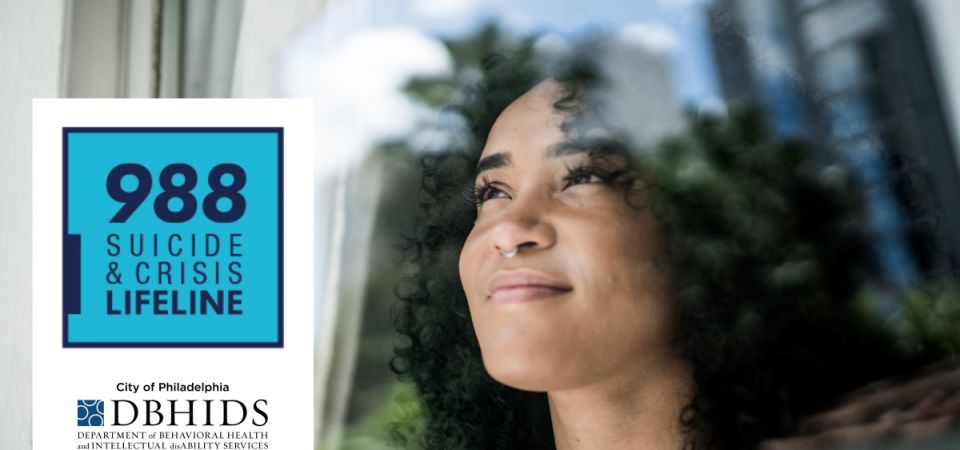One in six Philadelphians has been diagnosed with some form of mental illness. But, still, people shy away from discussing mental health — especially when it involves themselves or loved ones.
May is Mental Health Awareness Month. This month — and every month — always remember: It’s OK to not be OK. You’re not alone. DBHIDS — the City of Philadelphia Department of Behavioral Health and Intellectual disAbility Services — is here to help.
988: New Suicide and Crisis Lifeline
Philadelphia County residents now have a new, easier way to connect to behavioral or mental health crisis services.
The 988 Suicide and Crisis Lifeline offers 24/7 access to compassionate, trained professionals. Callers experiencing suicidal feelings, substance use and/or mental health crisis, or any other kind of emotional distress, will receive counseling, guidance, and direction for receiving prompt evaluation and treatment services.
988 serves as a universal entry point so that no matter where you live in the United States, you can reach a trained crisis counselor who can help.
988 Suicide and Crisis Lifeline services can be used by anyone, any time (24 hours a day, seven days a week, 365 days a year), at no cost to the caller. For more information, visit DBHIDS.org/988. Callers who are deaf or hard of hearing can use their preferred relay service or dial 711 then 988.

Network of Neighbors trauma response
Individuals all respond to trauma in different ways — and neighborhoods do as well. If your neighborhood has experienced a traumatic event, the City of Philadelphia Department of Behavioral Health and Intellectual disAbility Services’ Network of Neighbors is here to help.
Trauma is any overwhelmingly stressful experience that can shatter a sense of choice, safety, and trust.
Network of Neighbors is a free, community-driven trauma response network that works to reduce violence and trauma by working alongside the community to address their experience, defining needs and boundaries, and putting community safety and choice first.
Network of Neighbors offers support to reduce stress and isolation, encourage social connection, tap into the natural strengths of the community, and begin the healing process.
The Network is not a violence-prevention or anti-violence program. Instead, the Network is focused on addressing the impact of trauma on individuals and communities.
Click to learn more about DBHIDS Network of Neighbors — or contact network leaders at 267-233-4837 or NetworkofNeighbors@phila.gov.

Mental Health First Aid
Mental Health First Aid teaches people just like you how to identify, understand, and respond to signs of mental illnesses and substance use disorders. Just like physical aid gives you the tools to bridge the vital minutes until a trained professional arrives, Mental Health First Aid can help you help a friend, family member, or neighbor when they need it most.
Research shows that Mental Health First Aid leads to greater recognition of behavioral health challenges, increased confidence in one’s ability to help, increased amount of help provided, and decreased stigmatizing attitudes while promoting inclusion.
Click to learn more about Mental Health First Aid, including how to register for a course.
About DBHIDS
The Department of Behavioral Health and Intellectual disAbility Services is a City of Philadelphia government department dedicated to educating, strengthening, and serving individuals and communities so that all Philadelphians can thrive.
We envision a Philadelphia where every individual can achieve health, well-being, and self-determination.
DBHIDS provides services and support for almost 200,000 people every year in Philadelphia through the initiatives described above, and many more.
Click to learn more about DBHIDS and HealthyMindsPhilly.org.

